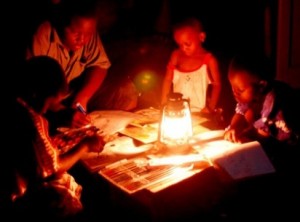Ghanaians’ displeasure with gov’t on electricity was 7th highest in Africa
 The Ghanaian public’s discontent with government’s handling of electricity supply was the 7th highest among 35 countries on the continent during the power crisis “dumsor” in 2014/2015.
The Ghanaian public’s discontent with government’s handling of electricity supply was the 7th highest among 35 countries on the continent during the power crisis “dumsor” in 2014/2015.
Only 23 per cent of Ghanaians judged the government to be doing well in its handling of providing reliable electricity supply, according to an Afrobarometer survey on grid connectivity and electricity supply on the continent during the period.
The 23 per cent contrasts sharply with Mauritius, the best performing country where the government had the approval of 91 per cent.
Madagascar’s government was the least performing by citizens’ approval, garnering positive response of only 7 per cent.
The study also found the Ghanaian public’s disapproval with handling of the energy crisis, represented the highest decline on the continent since 2008. While there was an average two per cent decline in satisfaction with electricity on the continent over the period, Ghana recorded a staggering 40 per cent increase in public disapproval between 2008 and 2015, reflecting the severity of the energy deficit.
According to the Institute of Statistical, Social and Economic Research (ISSER) at the University of Ghana, the protracted energy crisis which caused many businesses to fold up, resulted in a loss of between GH₵320 million and GH₵924 million in 2014 – about two to six per cent of GDP.
A study at the University of Ghana by five researchers also established a risk of anxiety disorders among students due to the energy crisis. It found that 45.2 per cent of students experienced moderate to severe anxiety due to the energy crisis and nearly one-third (26 per cent) felt nervous, anxious or on edge on an almost daily basis.
According to Afrobarometer, about 87 per cent of Ghanaian households were connected to the electricity grid during the period 2014/2015, but only 37 per cent of the connected households had reliable power.
Surveying 36 countries with nearly 54,000 interviews, Afrobarometer’s research concludes that “more than a century after the invention of the light bulb, a majority of Africans are still in the dark, either intermittently or constantly.”
On average, only four in ten Africans enjoy reliable power supply and approve of their government’s performance in electricity supply, though six in ten are connected to their national grid.
“In some countries, the electric grid reaches only a fraction of the population; in others,
an extensive grid is undermined by inadequate supply and poor service. Most countries face a combination of these issues, and ambitious initiatives to improve electricity supply will need country-level analyses to determine the needed balance of grid extension, growth in supply, improved service and alternative sources,” Afrobarometer said in their report.
The only exceptions are Mauritius, with universal access and in North Africa, particularly Algeria, Tunisia and Egypt, where electricity coverage is very near total.
“While North African countries and Mauritius are able to provide reliable electricity for most or all of their citizens, they are the exception, particularly when it comes to serving rural and poor populations,” the report says.
Cape Verde, Mali, Swaziland, South Africa, Côte d’Ivoire, and Gabon are also said to have more than 80 per cent of connections working most of the time.
By Emmanuel Odonkor
